Holmes Institute HI6008 Business Research Reflection Report
VerifiedAdded on 2022/10/06
|7
|1681
|32
Report
AI Summary
This reflection report analyzes a student's contribution to a business research project, focusing on outsourcing. The student actively participated in topic selection, exploring the advantages and disadvantages of outsourcing, and formulating research questions. The report details the student's involvement in literature reviews, research methodology (qualitative and quantitative), and data collection techniques. The student reflects on the learning experiences from lectures, including research design, ethics, and data analysis, and how this knowledge will benefit their future career in business development. The report references various academic sources to support the analysis of the research process and the student's role within it.
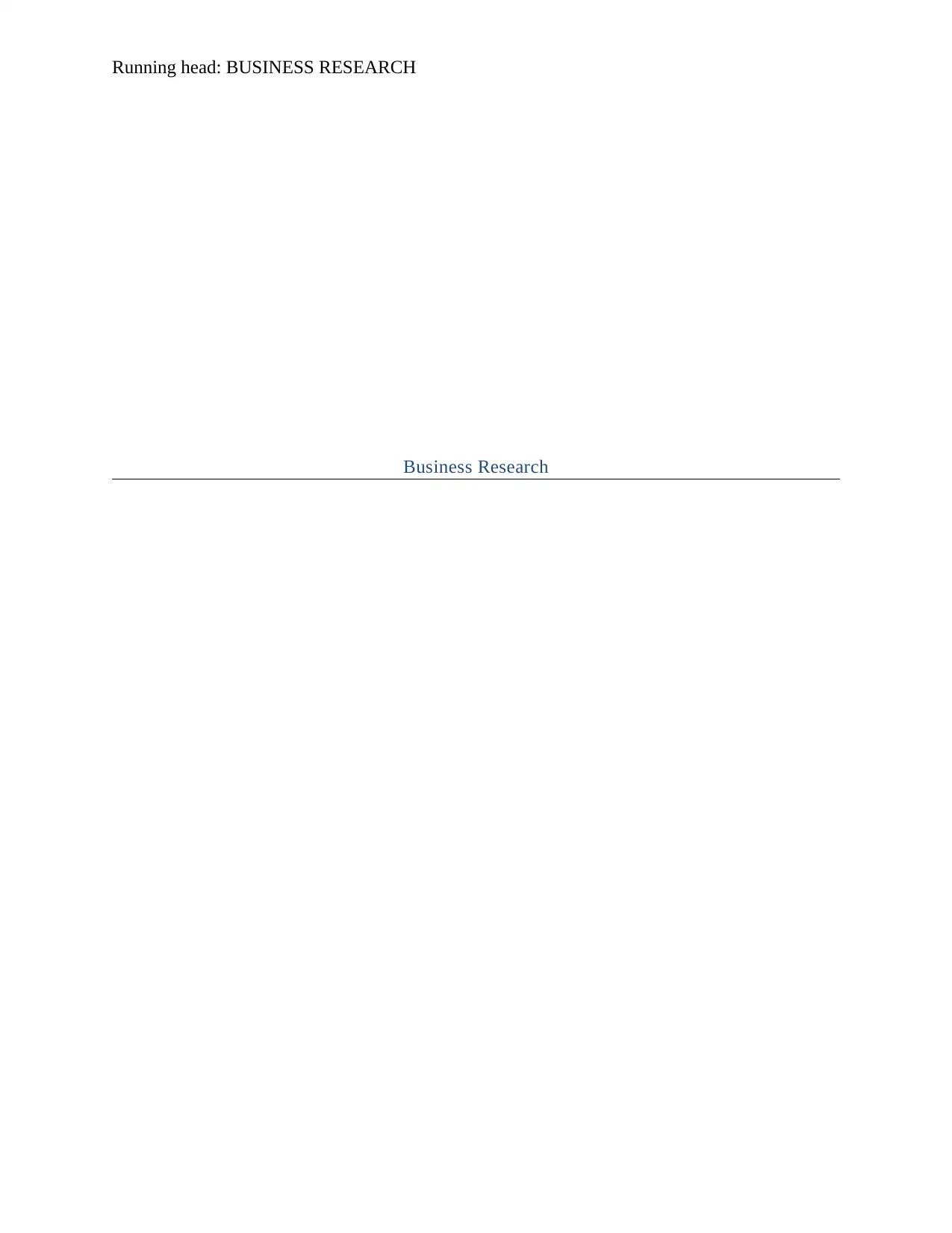
Running head: BUSINESS RESEARCH
Business Research
Business Research
Paraphrase This Document
Need a fresh take? Get an instant paraphrase of this document with our AI Paraphraser
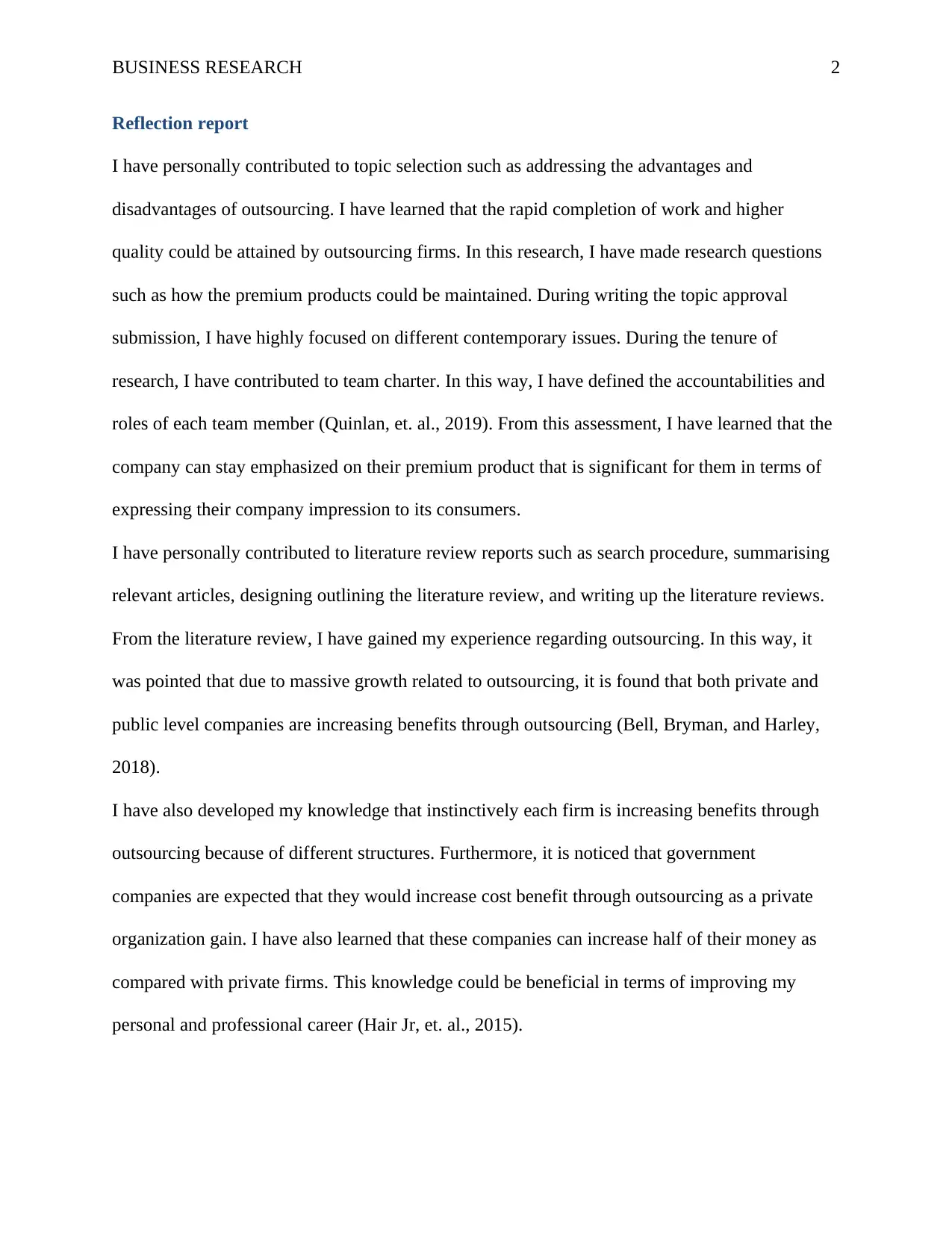
BUSINESS RESEARCH 2
Reflection report
I have personally contributed to topic selection such as addressing the advantages and
disadvantages of outsourcing. I have learned that the rapid completion of work and higher
quality could be attained by outsourcing firms. In this research, I have made research questions
such as how the premium products could be maintained. During writing the topic approval
submission, I have highly focused on different contemporary issues. During the tenure of
research, I have contributed to team charter. In this way, I have defined the accountabilities and
roles of each team member (Quinlan, et. al., 2019). From this assessment, I have learned that the
company can stay emphasized on their premium product that is significant for them in terms of
expressing their company impression to its consumers.
I have personally contributed to literature review reports such as search procedure, summarising
relevant articles, designing outlining the literature review, and writing up the literature reviews.
From the literature review, I have gained my experience regarding outsourcing. In this way, it
was pointed that due to massive growth related to outsourcing, it is found that both private and
public level companies are increasing benefits through outsourcing (Bell, Bryman, and Harley,
2018).
I have also developed my knowledge that instinctively each firm is increasing benefits through
outsourcing because of different structures. Furthermore, it is noticed that government
companies are expected that they would increase cost benefit through outsourcing as a private
organization gain. I have also learned that these companies can increase half of their money as
compared with private firms. This knowledge could be beneficial in terms of improving my
personal and professional career (Hair Jr, et. al., 2015).
Reflection report
I have personally contributed to topic selection such as addressing the advantages and
disadvantages of outsourcing. I have learned that the rapid completion of work and higher
quality could be attained by outsourcing firms. In this research, I have made research questions
such as how the premium products could be maintained. During writing the topic approval
submission, I have highly focused on different contemporary issues. During the tenure of
research, I have contributed to team charter. In this way, I have defined the accountabilities and
roles of each team member (Quinlan, et. al., 2019). From this assessment, I have learned that the
company can stay emphasized on their premium product that is significant for them in terms of
expressing their company impression to its consumers.
I have personally contributed to literature review reports such as search procedure, summarising
relevant articles, designing outlining the literature review, and writing up the literature reviews.
From the literature review, I have gained my experience regarding outsourcing. In this way, it
was pointed that due to massive growth related to outsourcing, it is found that both private and
public level companies are increasing benefits through outsourcing (Bell, Bryman, and Harley,
2018).
I have also developed my knowledge that instinctively each firm is increasing benefits through
outsourcing because of different structures. Furthermore, it is noticed that government
companies are expected that they would increase cost benefit through outsourcing as a private
organization gain. I have also learned that these companies can increase half of their money as
compared with private firms. This knowledge could be beneficial in terms of improving my
personal and professional career (Hair Jr, et. al., 2015).
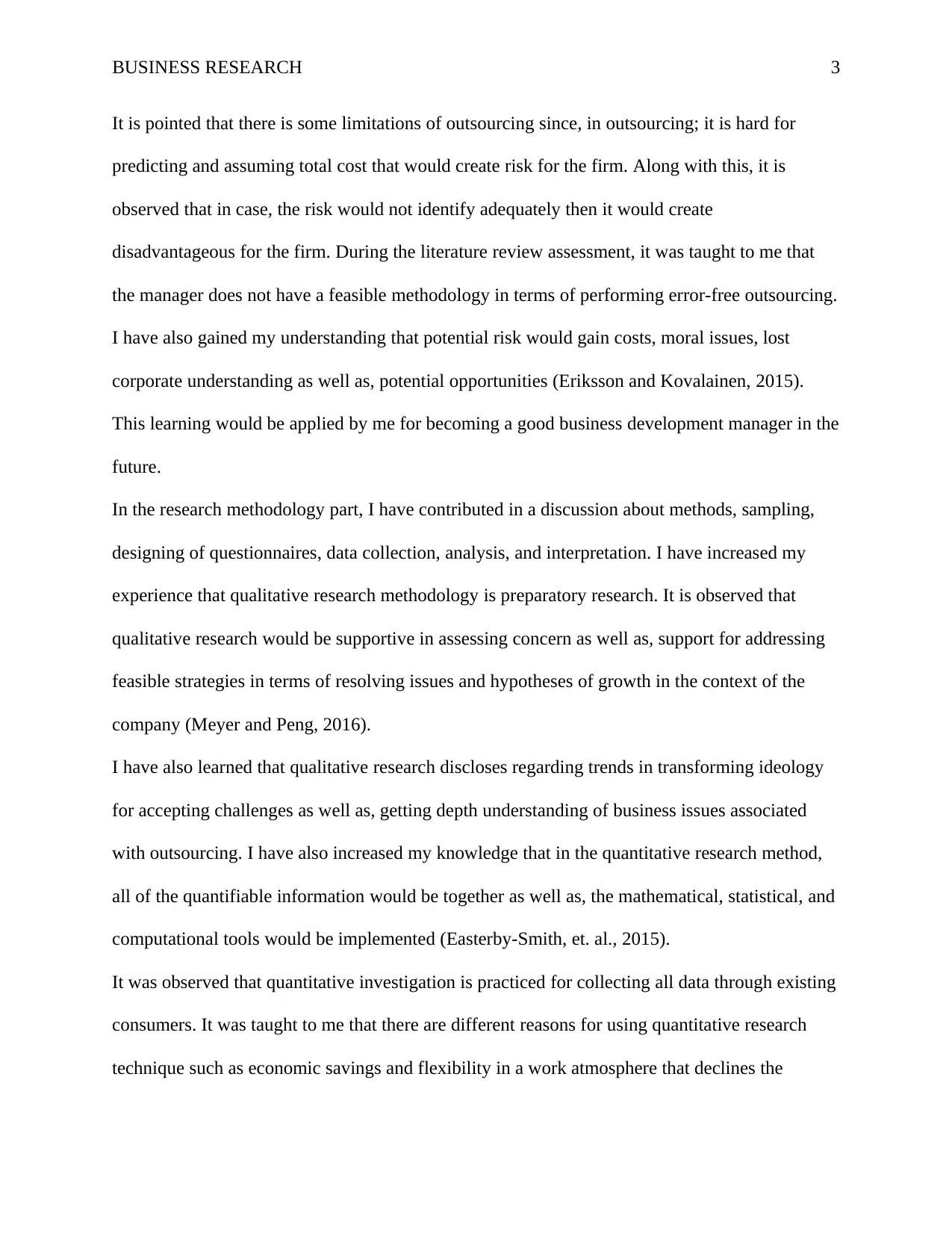
BUSINESS RESEARCH 3
It is pointed that there is some limitations of outsourcing since, in outsourcing; it is hard for
predicting and assuming total cost that would create risk for the firm. Along with this, it is
observed that in case, the risk would not identify adequately then it would create
disadvantageous for the firm. During the literature review assessment, it was taught to me that
the manager does not have a feasible methodology in terms of performing error-free outsourcing.
I have also gained my understanding that potential risk would gain costs, moral issues, lost
corporate understanding as well as, potential opportunities (Eriksson and Kovalainen, 2015).
This learning would be applied by me for becoming a good business development manager in the
future.
In the research methodology part, I have contributed in a discussion about methods, sampling,
designing of questionnaires, data collection, analysis, and interpretation. I have increased my
experience that qualitative research methodology is preparatory research. It is observed that
qualitative research would be supportive in assessing concern as well as, support for addressing
feasible strategies in terms of resolving issues and hypotheses of growth in the context of the
company (Meyer and Peng, 2016).
I have also learned that qualitative research discloses regarding trends in transforming ideology
for accepting challenges as well as, getting depth understanding of business issues associated
with outsourcing. I have also increased my knowledge that in the quantitative research method,
all of the quantifiable information would be together as well as, the mathematical, statistical, and
computational tools would be implemented (Easterby-Smith, et. al., 2015).
It was observed that quantitative investigation is practiced for collecting all data through existing
consumers. It was taught to me that there are different reasons for using quantitative research
technique such as economic savings and flexibility in a work atmosphere that declines the
It is pointed that there is some limitations of outsourcing since, in outsourcing; it is hard for
predicting and assuming total cost that would create risk for the firm. Along with this, it is
observed that in case, the risk would not identify adequately then it would create
disadvantageous for the firm. During the literature review assessment, it was taught to me that
the manager does not have a feasible methodology in terms of performing error-free outsourcing.
I have also gained my understanding that potential risk would gain costs, moral issues, lost
corporate understanding as well as, potential opportunities (Eriksson and Kovalainen, 2015).
This learning would be applied by me for becoming a good business development manager in the
future.
In the research methodology part, I have contributed in a discussion about methods, sampling,
designing of questionnaires, data collection, analysis, and interpretation. I have increased my
experience that qualitative research methodology is preparatory research. It is observed that
qualitative research would be supportive in assessing concern as well as, support for addressing
feasible strategies in terms of resolving issues and hypotheses of growth in the context of the
company (Meyer and Peng, 2016).
I have also learned that qualitative research discloses regarding trends in transforming ideology
for accepting challenges as well as, getting depth understanding of business issues associated
with outsourcing. I have also increased my knowledge that in the quantitative research method,
all of the quantifiable information would be together as well as, the mathematical, statistical, and
computational tools would be implemented (Easterby-Smith, et. al., 2015).
It was observed that quantitative investigation is practiced for collecting all data through existing
consumers. It was taught to me that there are different reasons for using quantitative research
technique such as economic savings and flexibility in a work atmosphere that declines the
⊘ This is a preview!⊘
Do you want full access?
Subscribe today to unlock all pages.

Trusted by 1+ million students worldwide
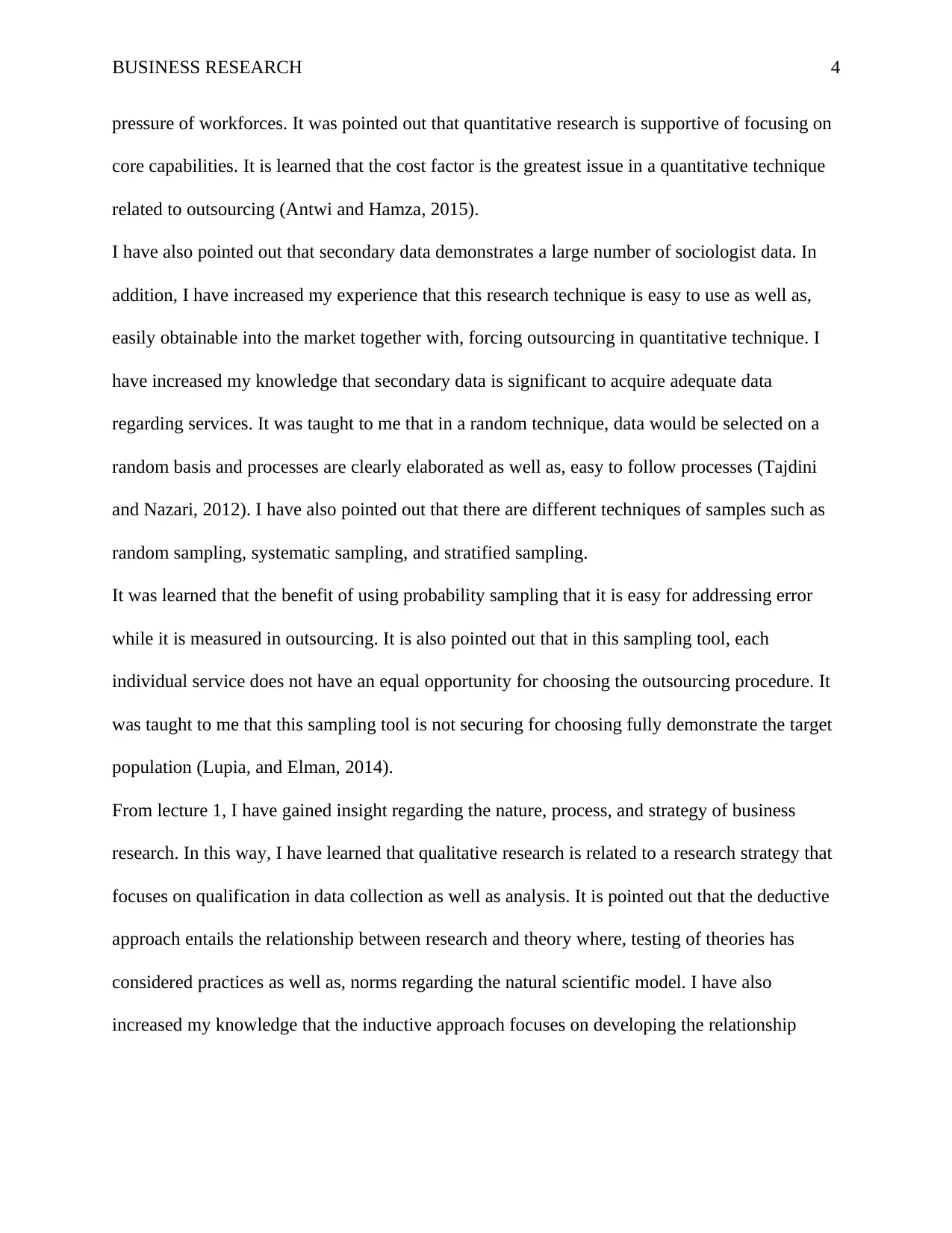
BUSINESS RESEARCH 4
pressure of workforces. It was pointed out that quantitative research is supportive of focusing on
core capabilities. It is learned that the cost factor is the greatest issue in a quantitative technique
related to outsourcing (Antwi and Hamza, 2015).
I have also pointed out that secondary data demonstrates a large number of sociologist data. In
addition, I have increased my experience that this research technique is easy to use as well as,
easily obtainable into the market together with, forcing outsourcing in quantitative technique. I
have increased my knowledge that secondary data is significant to acquire adequate data
regarding services. It was taught to me that in a random technique, data would be selected on a
random basis and processes are clearly elaborated as well as, easy to follow processes (Tajdini
and Nazari, 2012). I have also pointed out that there are different techniques of samples such as
random sampling, systematic sampling, and stratified sampling.
It was learned that the benefit of using probability sampling that it is easy for addressing error
while it is measured in outsourcing. It is also pointed out that in this sampling tool, each
individual service does not have an equal opportunity for choosing the outsourcing procedure. It
was taught to me that this sampling tool is not securing for choosing fully demonstrate the target
population (Lupia, and Elman, 2014).
From lecture 1, I have gained insight regarding the nature, process, and strategy of business
research. In this way, I have learned that qualitative research is related to a research strategy that
focuses on qualification in data collection as well as analysis. It is pointed out that the deductive
approach entails the relationship between research and theory where, testing of theories has
considered practices as well as, norms regarding the natural scientific model. I have also
increased my knowledge that the inductive approach focuses on developing the relationship
pressure of workforces. It was pointed out that quantitative research is supportive of focusing on
core capabilities. It is learned that the cost factor is the greatest issue in a quantitative technique
related to outsourcing (Antwi and Hamza, 2015).
I have also pointed out that secondary data demonstrates a large number of sociologist data. In
addition, I have increased my experience that this research technique is easy to use as well as,
easily obtainable into the market together with, forcing outsourcing in quantitative technique. I
have increased my knowledge that secondary data is significant to acquire adequate data
regarding services. It was taught to me that in a random technique, data would be selected on a
random basis and processes are clearly elaborated as well as, easy to follow processes (Tajdini
and Nazari, 2012). I have also pointed out that there are different techniques of samples such as
random sampling, systematic sampling, and stratified sampling.
It was learned that the benefit of using probability sampling that it is easy for addressing error
while it is measured in outsourcing. It is also pointed out that in this sampling tool, each
individual service does not have an equal opportunity for choosing the outsourcing procedure. It
was taught to me that this sampling tool is not securing for choosing fully demonstrate the target
population (Lupia, and Elman, 2014).
From lecture 1, I have gained insight regarding the nature, process, and strategy of business
research. In this way, I have learned that qualitative research is related to a research strategy that
focuses on qualification in data collection as well as analysis. It is pointed out that the deductive
approach entails the relationship between research and theory where, testing of theories has
considered practices as well as, norms regarding the natural scientific model. I have also
increased my knowledge that the inductive approach focuses on developing the relationship
Paraphrase This Document
Need a fresh take? Get an instant paraphrase of this document with our AI Paraphraser
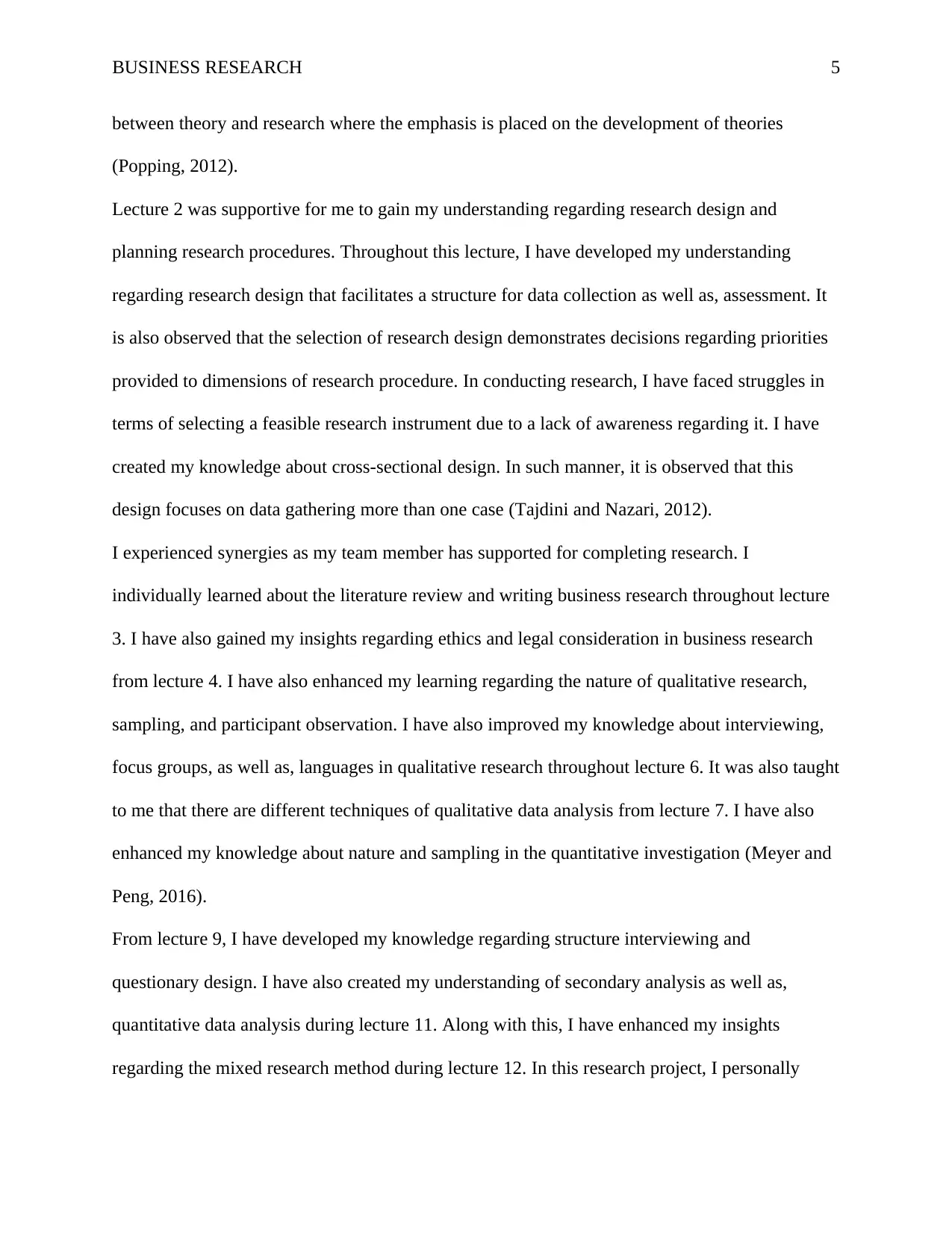
BUSINESS RESEARCH 5
between theory and research where the emphasis is placed on the development of theories
(Popping, 2012).
Lecture 2 was supportive for me to gain my understanding regarding research design and
planning research procedures. Throughout this lecture, I have developed my understanding
regarding research design that facilitates a structure for data collection as well as, assessment. It
is also observed that the selection of research design demonstrates decisions regarding priorities
provided to dimensions of research procedure. In conducting research, I have faced struggles in
terms of selecting a feasible research instrument due to a lack of awareness regarding it. I have
created my knowledge about cross-sectional design. In such manner, it is observed that this
design focuses on data gathering more than one case (Tajdini and Nazari, 2012).
I experienced synergies as my team member has supported for completing research. I
individually learned about the literature review and writing business research throughout lecture
3. I have also gained my insights regarding ethics and legal consideration in business research
from lecture 4. I have also enhanced my learning regarding the nature of qualitative research,
sampling, and participant observation. I have also improved my knowledge about interviewing,
focus groups, as well as, languages in qualitative research throughout lecture 6. It was also taught
to me that there are different techniques of qualitative data analysis from lecture 7. I have also
enhanced my knowledge about nature and sampling in the quantitative investigation (Meyer and
Peng, 2016).
From lecture 9, I have developed my knowledge regarding structure interviewing and
questionary design. I have also created my understanding of secondary analysis as well as,
quantitative data analysis during lecture 11. Along with this, I have enhanced my insights
regarding the mixed research method during lecture 12. In this research project, I personally
between theory and research where the emphasis is placed on the development of theories
(Popping, 2012).
Lecture 2 was supportive for me to gain my understanding regarding research design and
planning research procedures. Throughout this lecture, I have developed my understanding
regarding research design that facilitates a structure for data collection as well as, assessment. It
is also observed that the selection of research design demonstrates decisions regarding priorities
provided to dimensions of research procedure. In conducting research, I have faced struggles in
terms of selecting a feasible research instrument due to a lack of awareness regarding it. I have
created my knowledge about cross-sectional design. In such manner, it is observed that this
design focuses on data gathering more than one case (Tajdini and Nazari, 2012).
I experienced synergies as my team member has supported for completing research. I
individually learned about the literature review and writing business research throughout lecture
3. I have also gained my insights regarding ethics and legal consideration in business research
from lecture 4. I have also enhanced my learning regarding the nature of qualitative research,
sampling, and participant observation. I have also improved my knowledge about interviewing,
focus groups, as well as, languages in qualitative research throughout lecture 6. It was also taught
to me that there are different techniques of qualitative data analysis from lecture 7. I have also
enhanced my knowledge about nature and sampling in the quantitative investigation (Meyer and
Peng, 2016).
From lecture 9, I have developed my knowledge regarding structure interviewing and
questionary design. I have also created my understanding of secondary analysis as well as,
quantitative data analysis during lecture 11. Along with this, I have enhanced my insights
regarding the mixed research method during lecture 12. In this research project, I personally
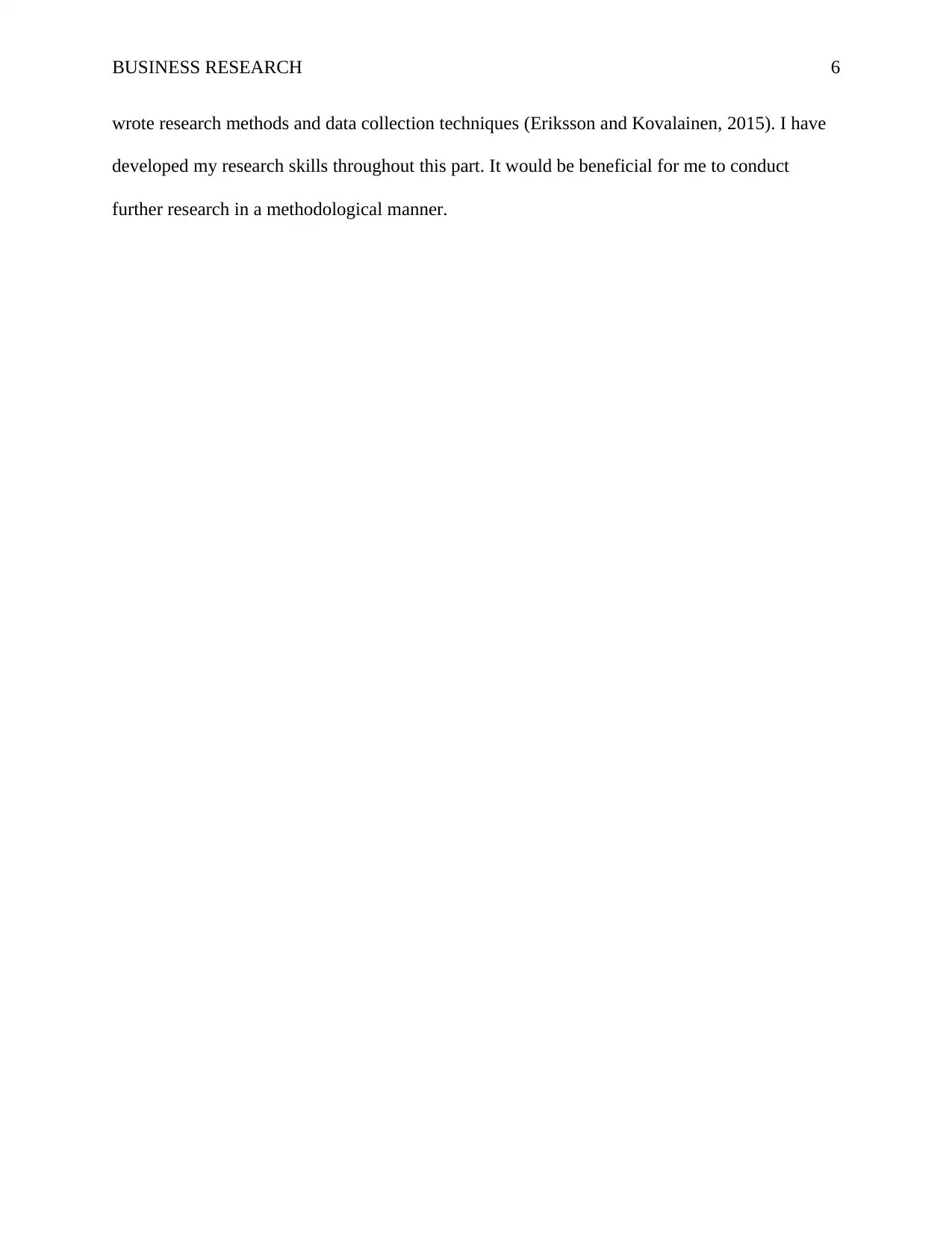
BUSINESS RESEARCH 6
wrote research methods and data collection techniques (Eriksson and Kovalainen, 2015). I have
developed my research skills throughout this part. It would be beneficial for me to conduct
further research in a methodological manner.
wrote research methods and data collection techniques (Eriksson and Kovalainen, 2015). I have
developed my research skills throughout this part. It would be beneficial for me to conduct
further research in a methodological manner.
⊘ This is a preview!⊘
Do you want full access?
Subscribe today to unlock all pages.

Trusted by 1+ million students worldwide
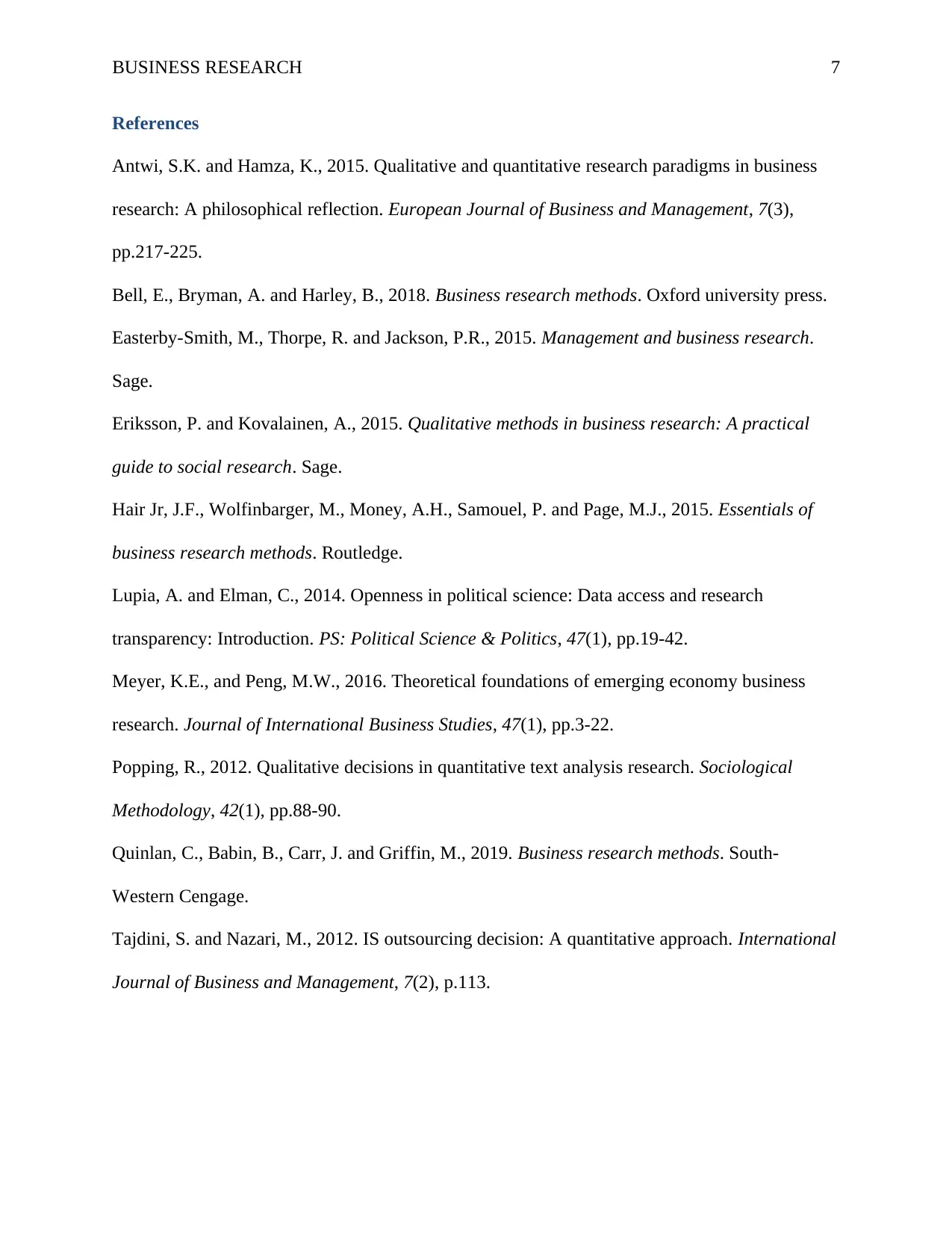
BUSINESS RESEARCH 7
References
Antwi, S.K. and Hamza, K., 2015. Qualitative and quantitative research paradigms in business
research: A philosophical reflection. European Journal of Business and Management, 7(3),
pp.217-225.
Bell, E., Bryman, A. and Harley, B., 2018. Business research methods. Oxford university press.
Easterby-Smith, M., Thorpe, R. and Jackson, P.R., 2015. Management and business research.
Sage.
Eriksson, P. and Kovalainen, A., 2015. Qualitative methods in business research: A practical
guide to social research. Sage.
Hair Jr, J.F., Wolfinbarger, M., Money, A.H., Samouel, P. and Page, M.J., 2015. Essentials of
business research methods. Routledge.
Lupia, A. and Elman, C., 2014. Openness in political science: Data access and research
transparency: Introduction. PS: Political Science & Politics, 47(1), pp.19-42.
Meyer, K.E., and Peng, M.W., 2016. Theoretical foundations of emerging economy business
research. Journal of International Business Studies, 47(1), pp.3-22.
Popping, R., 2012. Qualitative decisions in quantitative text analysis research. Sociological
Methodology, 42(1), pp.88-90.
Quinlan, C., Babin, B., Carr, J. and Griffin, M., 2019. Business research methods. South-
Western Cengage.
Tajdini, S. and Nazari, M., 2012. IS outsourcing decision: A quantitative approach. International
Journal of Business and Management, 7(2), p.113.
References
Antwi, S.K. and Hamza, K., 2015. Qualitative and quantitative research paradigms in business
research: A philosophical reflection. European Journal of Business and Management, 7(3),
pp.217-225.
Bell, E., Bryman, A. and Harley, B., 2018. Business research methods. Oxford university press.
Easterby-Smith, M., Thorpe, R. and Jackson, P.R., 2015. Management and business research.
Sage.
Eriksson, P. and Kovalainen, A., 2015. Qualitative methods in business research: A practical
guide to social research. Sage.
Hair Jr, J.F., Wolfinbarger, M., Money, A.H., Samouel, P. and Page, M.J., 2015. Essentials of
business research methods. Routledge.
Lupia, A. and Elman, C., 2014. Openness in political science: Data access and research
transparency: Introduction. PS: Political Science & Politics, 47(1), pp.19-42.
Meyer, K.E., and Peng, M.W., 2016. Theoretical foundations of emerging economy business
research. Journal of International Business Studies, 47(1), pp.3-22.
Popping, R., 2012. Qualitative decisions in quantitative text analysis research. Sociological
Methodology, 42(1), pp.88-90.
Quinlan, C., Babin, B., Carr, J. and Griffin, M., 2019. Business research methods. South-
Western Cengage.
Tajdini, S. and Nazari, M., 2012. IS outsourcing decision: A quantitative approach. International
Journal of Business and Management, 7(2), p.113.
1 out of 7
Related Documents
Your All-in-One AI-Powered Toolkit for Academic Success.
+13062052269
info@desklib.com
Available 24*7 on WhatsApp / Email
![[object Object]](/_next/static/media/star-bottom.7253800d.svg)
Unlock your academic potential
Copyright © 2020–2026 A2Z Services. All Rights Reserved. Developed and managed by ZUCOL.





